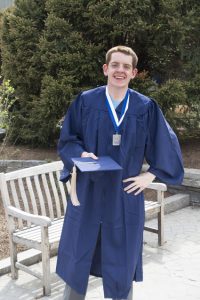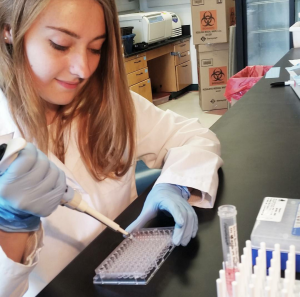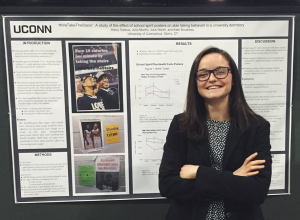Steven Reilly ’17 (BUS) shares his circuitous path into a marketing thesis project on Daily Fantasy Sports.
As with many things at UConn, the Honors Thesis experience is ultimately what you make of it. To some students, it is a culmination of their undergraduate careers. To others, it is a chance to delve deeply into a topic that they find interesting. And to some, the Honors Thesis is the final lengthy paper that they will complete before stepping into the real world. For me, the Honors Thesis was all of these things and more. My thesis ended up acting as a capstone project that required me to reflect on the different Marketing classes I had taken, and to utilize all of the skills that I had learned. However, it did not begin like this.
Like most students that I have spoken to, my thesis project began with a great deal of uncertainty. I was having trouble finding an advisor largely due to my inconclusiveness towards what topic I wanted to research. I was also anxious about picking a topic that didn’t have a substantial amount of previous scholarly research, since I was so familiar with creating papers that sourced peer-reviewed journals. I knew I wanted to spend the Fall semester of my senior year researching my thesis topic before writing the actual thesis in the Spring, but as August crept up, I recognized that I needed some guidance. I scheduled an appointment with my Honors advisor.
While I had visited my Honors advisor before my senior year, it was never for anything beyond a couple questions about course selection. I had always prided myself on being able to determine my own schedules and course loads, but I also realized that I could use all of the help I could get on my Honors Thesis. When I told Dr. Narasimhan Srinivasan, my Honors advisor, about my issue, he was quick to come up with a solution: He would serve as my Honors advisor for any topic I chose, as long as I promised to show interest and work hard. This sounded like a fair deal to me, and I went to work looking for a topic.
 The first couple of topics I discussed with Dr. Srinivasan were viable ideas, but they lacked the element of interest that we had spoken about earlier. I wanted to pick a topic that I could relate to through personal experience. After more deliberation, I decided to study the Daily Fantasy Sports (DFS) industry. I have always been a huge sports fan, and the dynamic billion-dollar DFS industry had recently come under scrutiny due to its similarity to illegal online gambling. Dr. Srinivasan encouraged me to research this idea, since I had experience playing the game and had an interest in the industry overall.
The first couple of topics I discussed with Dr. Srinivasan were viable ideas, but they lacked the element of interest that we had spoken about earlier. I wanted to pick a topic that I could relate to through personal experience. After more deliberation, I decided to study the Daily Fantasy Sports (DFS) industry. I have always been a huge sports fan, and the dynamic billion-dollar DFS industry had recently come under scrutiny due to its similarity to illegal online gambling. Dr. Srinivasan encouraged me to research this idea, since I had experience playing the game and had an interest in the industry overall.
While the Daily Fantasy Sports industry is a lucrative one, its relative youth made it difficult to research. While I had skills from my Intro to Marketing classes to analyze Daily Fantasy Sports companies through SWOT analyses and understanding of key business elements, there weren’t many peer-reviewed articles on Daily Fantasy Sports (as opposed to season-long fantasy). The companies that did produce research reports charged a great deal of money for them. Dr. Srinivasan had an inventive way to overcome this obstacle: he recommended that I email the company and see if they would give me the report for academic purposes only. Sure enough, after one persuasive email, the research firm was happy to oblige. With my newly acquired research reports, I was ready to compile my own findings on the Daily Fantasy Sports industry.
In December, with my preliminary research completed, I was prepared to move on to my actual Honors Thesis. While I had learned a lot about the industry, its companies, and its legal climate, I did not feel that I had a good grasp on its customers. In multiple Marketing classes, we are taught that customers ultimately act as the vehicle that determines the value of a product. So, in order to learn more about Daily Fantasy Sports players, Dr. Srinivasan and I created a Qualtrics survey to distribute to those who had played Daily Fantasy Sports in the last 12 months. We submitted the survey to UConn’s Institutional Review Board.
After a fairly lengthy IRB approval process, I was given permission to distribute the survey. Because of our niche target demographic, I needed to get creative with how I procured responses. I distributed the survey on Reddit websites that catered to Daily Fantasy Sports. With the help of the OUR Supply Award, I also distributed the survey through Amazon MTurk, a website that allows you to pay survey respondents a small fee for successfully completing your survey. I had over 1,000 responses to the survey within a couple of weeks.
After a weekend spent brushing up on statistical software that I had learned to use in my Marketing Research class, I was ready to test my hypotheses. A series of different tests revealed quickly that many of my hypotheses were untrue, and many of my projected correlations were not as strong as I thought they might be. Dr. Srinivasan reminded me to not get discouraged, since learning that you are incorrect is a vital part of the research process. Nevertheless, while I had been wrong is some of my assumptions, I found different new and interesting trends that I ended up writing about in my final paper.
In the final weeks of the semester, I completed my Honors Thesis and turned it in to the Honors Office. What a sense of accomplishment! The Thesis experience was truly a journey that forced me to hone many skills that I had gained through my college career. I had used my basic understanding of business elements to break down an industry. I used my understanding of marketing strategy to prognosticate potential next steps companies in the industry might take. I persuaded a research firm to provide me with information utilizing some of the tactics taught in UConn sales classes. I also used statistical testing and writing skills I had obtained in prior classes to put together the final report. Overall, my Honors Thesis was truly a capstone project that revealed to me how many different talents can be combined to create a successful project.
Now that my time at UConn is over, there is so much to remember: experiences, friends, classes, professors, and more. My Honors Thesis experience will be one of the many positive experiences I look back on anytime I reflect on my time at UConn. While the process was a challenging one, it was made easier by Dr. Srinivasan, as well as the many advisors and professors that provided me with a helping hand along the way. I know that I will face many more challenges as I head off into the working world. I can only hope that I will be provided with the same support that allowed me to succeed at UConn in my future endeavors.
 As I progressed in the laboratory, Dr. Blesso and I developed ideas for my own independent project, and I chose to learn cell culturing techniques so I could carry out experiments focusing on a bioactive component of milk called sphingomyelin. My interests were in studying the role of sphingomyelin as a dietary intervention for non-alcoholic fatty liver disease, modeling the disease state in a cancerous liver cell line. Once I had a plan for my own research project, Dr. Blesso suggested that I apply for the OUR Supply Award to help fund my experiments.
As I progressed in the laboratory, Dr. Blesso and I developed ideas for my own independent project, and I chose to learn cell culturing techniques so I could carry out experiments focusing on a bioactive component of milk called sphingomyelin. My interests were in studying the role of sphingomyelin as a dietary intervention for non-alcoholic fatty liver disease, modeling the disease state in a cancerous liver cell line. Once I had a plan for my own research project, Dr. Blesso suggested that I apply for the OUR Supply Award to help fund my experiments. Our projects were completed in Spring 2015 under the guidance of
Our projects were completed in Spring 2015 under the guidance of